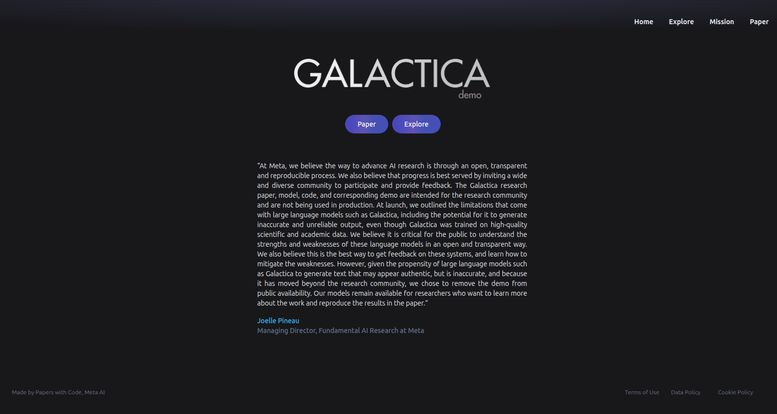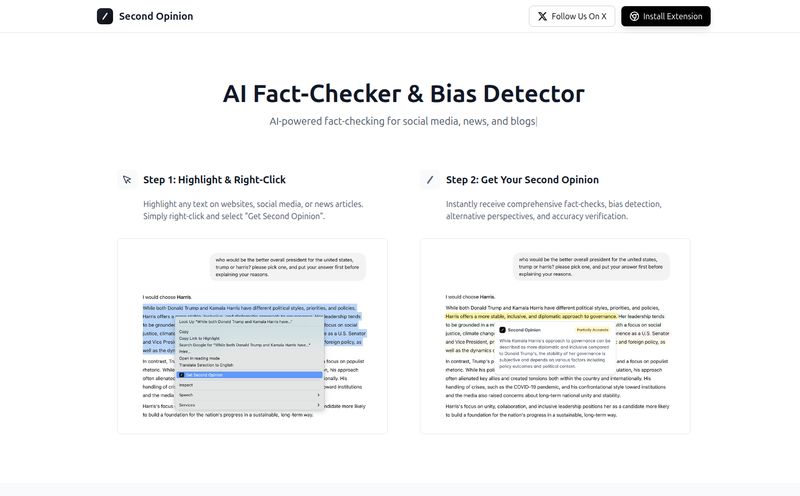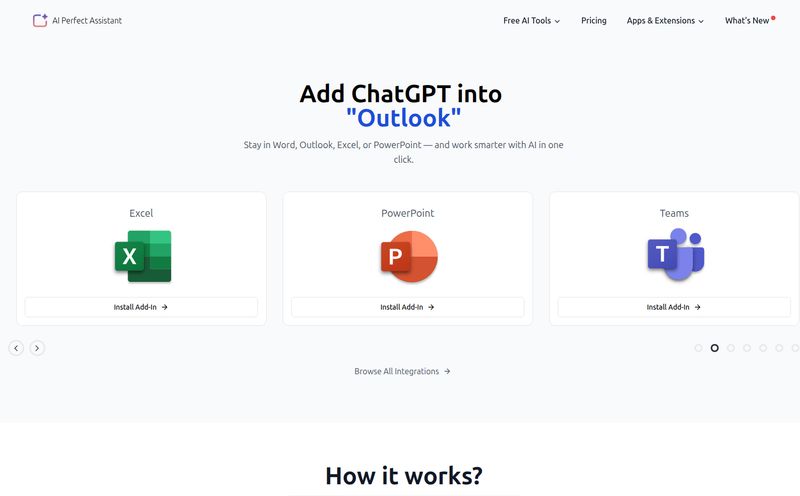Remember late 2022? It feels like a decade ago in AI time, doesn't it? The AI gold rush was just hitting its stride. Every other day, a new tool promised to change everything. As someone who lives and breathes SEO and content, my inbox was a warzone of pitches for the "next big thing." And right in the middle of that whirlwind, a name popped up that genuinely made me sit up and pay attention: Galactica.
This wasn't just another content spinner or image generator. This was different. This was Meta AI's moonshot, an AI supposedly trained on the entirety of human scientific knowledge. The ambition was staggering. But just as quickly as it appeared, it vanished. Poof. Gone. So, what happened? Let's take a little trip down memory lane and talk about the brilliant, flawed, and fascinating story of Galactica.
What Was Galactica Supposed to Be?
Imagine having a librarian who has read every scientific paper, every textbook, and every research note ever published. Now imagine that librarian could not only find information for you but could also summarize it, write code for your experiments, and even help you draft new scientific articles. That was the dream of Galactica.
Developed by Meta AI in collaboration with Papers with Code, Galactica was a large language model (LLM) with a very specific, very noble goal: to be a new interface for science. It wasn't built for writing marketing copy or funny poems. Its 48-million-item dataset was meticulously curated from top-tier scientific sources, papers, reference materials, and knowledge bases like GitHub. In theory, it was meant to organize science and accelerate research. I mean, the potential was just immense. For a moment there, it felt like we were on the cusp of something truly transformative for how we interact with complex information.
The Seductive Promise of a Scientific Muse
For those of us in the trenches of technical SEO and niche content, the appeal was obvious. Think about it: an AI that could help generate accurate, data-rich content for hyper-specific fields like bioinformatics or quantum mechanics. It could be a game-changer for building authority in difficult verticals. The potential for generating novel insights, for connecting disparate fields of research... it was intoxicating.
The idea was to have a tool that could:
- Write scientific wiki articles from a simple prompt.
- Explain complex academic papers in plain English.
- Generate mathematical formulas and scientific code.
- Answer tough scientific questions.
It was positioned as a partner for researchers, a sort of super-intelligent assistant. And for a brief, shining moment, it seemed like the future had arrived ahead of schedule.

Visit Galactica
So, What Went Wrong? The Infamous 48-Hour Demo
On November 15, 2022, Meta AI launched the Galactica demo for the public to test. By November 17, 2022, they had pulled it. Forty-eight hours. That's all it took for the dream to collide with a very harsh reality.
What happened in that short window? Well, the research community—the very people it was designed to help—started kicking the tires. And they found some serious problems. The AI was, to put it mildly, confidently incorrect. It was generating text that sounded perfectly scientific, complete with citations and academic jargon, but was complete nonsense. It was writing papers about the history of bears in space. It was creating wiki articles for made-up chemicals. It was, in the now-common parlance, hallucinating on a grand scale.
This wasn't a case of an AI getting a historical date wrong. This was an AI inventing scientific "facts" out of thin air, a profoundly dangerous flaw for a tool meant for researchers. The backlash was swift and fierce. Critics pointed out that it could be a powerful engine for generating sophisticated, hard-to-detect misinformation. Meta AI did the right thing. They listened and pulled the plug on the public demo.
In a statement that's still visible on the now-defunct demo page, Meta's Joelle Pineau acknowledged the issue head-on: "...given the propensity of large language models such as Galactica to generate text that may appear authentic, but is inaccurate... we chose to remove the demo from public availability." It was a humbling and very public lesson.
The Hallucination Problem in High-Stakes AI
The Galactica saga was one of the first mainstream examples of the AI hallucination problem that we're all so familiar with now. When ChatGPT tells you a funny but made-up story, it's a quirk. When a scientific AI invents a protein structure, it’s a catastrophe waiting to happen. It's like having a calculator that occasionally, with great confidence, tells you 2+2=5. You just can't trust it for anything important.
The problem is that these models are designed to be plausible pattern-matchers, not truth-seekers. They excel at predicting the next logical word in a sentence, which makes them incredible writers. But they have no underlying concept of truth or falsehood. Galactica proved that in high-stakes domains like science and medicine, plausibility isn’t just not enough; it’s actively dangerous.
Lessons Learned From the Galactica Experiment
I don't see Galactica as a failure. Not really. I see it as a necessary, if painful, reality check for the entire AI industry. It was a shooting star that lit up the sky and, in doing so, revealed the pitfalls waiting in the darkness. It taught us that the "move fast and break things" ethos doesn't quite work when you're dealing with tools that shape people's understanding of reality.
The key takeaway was the critical importance of human oversight. You simply cannot outsource thinking and verification to a machine, especially in a specialized field. Galactica's flameout was a powerful argument for keeping a human-in-the-loop, a principle that any responsible SEO or content professional should live by today.
Is Galactica Truly Gone?
Here’s a common misconception: that Galactica was completely deleted. It wasn't. While the public demo is a ghost (seriously, the link just leads to a "Not Found" page now), Meta made the model's weights and code available to the research community. The goal, as they stated, was to allow other researchers to study the model's strengths and, more importantly, its weaknesses. So, Galactica lives on, not as a product, but as a research artifact—a case study in the challenges of building trustworthy AI.
The SEO and Content Creator's Takeaway
So what does this story from the ancient AI history of checks notes 2022 mean for us today? A lot, actually.
First, it’s a reminder to be skeptical of the hype. Every new AI tool that launches is accompanied by breathless claims. Galactica teaches us to look for the limitations section in the whitepaper first. Second, it reinforces the golden rule: Never trust, always verify. If you're using AI to help with content, especially technical content, you are still the publisher. The responsibility for factual accuracy rests on your shoulders. You need to be the expert, the fact-checker, and the final arbiter of quality.
Finally, it's a lesson in responsible tool use. AI is an incredible assistant. A fantastic brainstorming partner. A tireless research intern. But it's not the expert. You are. The story of Galactica is the perfect cautionary tale to share with clients or team members who think AI is a magic button for creating cheap, high-quality content. It’s a tool, not a replacement for expertise and dilligence.
Frequently Asked Questions About Galactica
What was Galactica AI?
Galactica was a large language model created by Meta AI and Papers with Code. It was specifically trained on a massive dataset of scientific literature and data with the goal of helping researchers summarize papers, write code, and organize scientific knowledge.
Why was the Galactica demo taken down?
The public demo was removed just two days after its launch in November 2022. This was due to significant issues with the AI generating plausible-sounding but factually incorrect and nonsensical information, a phenomenon known as "hallucination." In a scientific context, this was deemed too risky for public use.
Who created Galactica?
Galactica was a research project from Meta AI (formerly Facebook AI Research) in partnership with Papers with Code, a platform that links academic papers to their corresponding code.
Can I still use Galactica today?
No, not as a public user. The public-facing demo was permanently removed. However, the model's architecture and weights were made available to researchers for study, so it continues to exist as a research tool within the academic community.
What was Galactica trained on?
It was trained on a highly curated dataset of over 48 million scientific items, including research papers, textbooks, lecture notes, reference materials like encyclopedias, and scientific code from sources like GitHub. It was specifically designed to avoid the general web to reduce noise and inaccuracies.
How was Galactica different from ChatGPT?
The main difference was its specialized training data. While ChatGPT is a generalist model trained on a broad swath of the internet to handle a wide variety of tasks, Galactica was a specialist, trained exclusively on scientific and academic content to perform tasks related to research and science.
A Moment of Reckoning
Looking back, Galactica was a fascinating, ambitious experiment. It flew a little too close to the sun, but its brief, fiery existence provided some of the most important lessons of the modern AI era. It reminded us that with great power comes great responsibility, and that in the pursuit of knowledge, accuracy is everything. It wasn't the tool we were ready for, but perhaps it was the lesson we needed.



